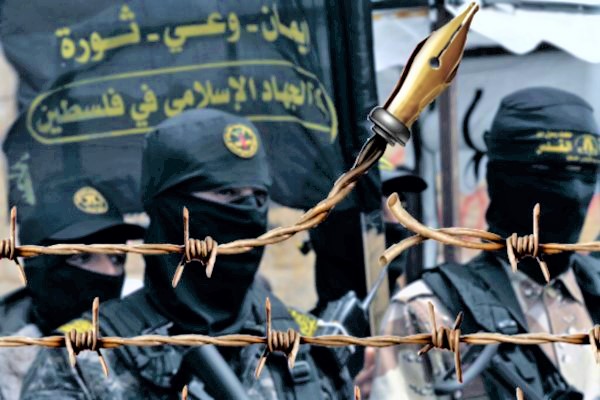Despite rescinding media restrictions demanding a gag order on rocket malfunctions, Hamas communicates to the press that reporting the truth about terror is a dangerous proposition.
By Pesach Benson, United with Israel
In response to Israel’s media success with Operation Breaking Dawn, Hamas issued — then rescinded — restrictive guidelines for journalists working in the Gaza Strip on Tuesday.
Although the restrictions were technically cancelled following discussions between the the Foreign Press Association and Hamas, the cancelled guidelines will still have a chilling effect on Western media coverage of the Strip.
The would-be rules are eye-opening.
Foreign journalists wishing to work in Gaza are already required to have a local “sponsor” — normally someone willing to vouch that the correspondent is a bona fide reporter. But under the rescinded rules, Hamas required the sponsors to accompany the journalists and be responsible for anti-Palestinian reporting.
The sponsors were also ordered to “demonstrate national spirit, defend the Palestinian narrative and reject the foreigner’s bias to the Israeli narrative,” and report to Hamas “any suspicious behavior or illogical questions.”
Hamas’ Interior Security also reportedly told local journalists in Gaza to pledge “not to report on—or allow foreign journalists to cover—rocket malfunctions, militant capabilities or their role in the build-up to the weekend’s conflict.”
As for local Palestinian journalists, anyone reporting a rocket misfire stood to lose their job.
The Foreign Press Association represents the interests of around 480 foreign reporters working in Israel, the Palestinian Authority and Gaza. Besides advocating for press freedom, the FPA helps foreign journalists navigate Israeli and Palestinian bureaucracy on issues like work visas, taxes and providing legal assistance.
The FPA had no choice but to object.
But neither is it surprising that Hamas quickly “backed down.”
The vast majority of Western journalism coming from Gaza is actually outsourced to Palestinian writers, photographers, cameramen, editors and producers. Unlike the Western bureau chiefs of heavyweight papers, such as the New York Times‘ Patrick Kingsley or the Washington Post’s Steve Hendrix, who site comfortably in Jerusalem, Palestinian journalists live in Gaza and dare not cross Hamas.
Hamas doesn’t respond to unfavorable media coverage with a social media post or letter to the editor. It knows where all the journalists live. Nobody wants to be invited to a police station for a chat about whatever they wrote or filmed.
A case in point in the negative coverage Hamas is clamping down on was a video aired live on Mayadeen TV, which ironically, is a Lebanese TV station operated by Hezbollah.
In the video, a rocket fired by Palestinian Islamic Jihad (PIJ) is seen rising from a civilian area launch site, veering of course and loudly exploding close to the film crew. The unseen narrator insists the rocket was launched to the sea but the camera shows smoke rising from a densely populated area.
A second off-camera voice — presumably a minder — is heard saying, “Please, turn the camera away, turn the camera upwards.”
Palestinian spin games falsely blaming the IDF for civilian casualties also failed. When an errant PIJ rocket struck the Jabaliya refugee camp, killing five children, the IDF was quick to release footage disproving the PIJ.
Foreign correspondents operate more freely in Judea and Samaria, of course, but they still rely on Palestinian journalists. They also rely on stringers — a support staff of translators, guides, and “fixers” who help arrange interviews and troubleshoot problems.
Unfortunately, these journalists and stringers are members of the Palestinian Journalists Syndicate, a Fatah-dominated organization viciously opposed to any semblance of normalization with Israel. It has expelled members over this taboo — most recently in June.
It makes no difference matter that the press restrictions were rescinded. Palestinians reporters got the message. They will be more careful to self-censor whatever Hamas considers bad news.
MAKE THE LAND OF ISRAEL EVEN MORE BEAUTIFUL!
PLANT YOUR VERY OWN FRUIT TREES IN ISRAEL!
Farmers near the Gaza border lost family, friends and workers. Spring is here, and they desperately need help to replant the farms. Join us in blessing the People and Land of Israel.
“I will ordain My blessing for you…” (Leviticus 25:4)
